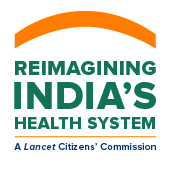In Conversation: Sudheer Kumar Shukla, Research Fellow, Lancet Commission
October 12, 2022

I have more than 7 years of research experience, which primarily focuses on health care financing, health systems strengthening, inequality in health behaviours, and economic analysis of health interventions. I have worked on inequalities in health behaviours, and expenditure outcomes, particularly those related to non-communicable diseases and tobacco-related illnesses. I was involved in the preparation of the Human Development Report for Delhi, Daman & Diu and Dadra & Nagar Haveli, ICMR-RSBY Report for Delhi, PACS-RSBY Report for Jharkhand & West Bengal, and the Food & Nutrition Security Report for World Bank, and has been the co-author for chapters on health and nutrition. I worked on several research projects, which were funded by Population Foundation of India, 3ie, Indian Council of Medical Research, ICSSR, ADB, WHO and The World Bank. Health financing is very significant aspect for achieving UHC in India and is relevant to my PhD research, ‘Health shocks and wellbeing among urban lower middle income group: A case study of the NCT of Delhi.’ When I was selected for the commission as Research Fellow, I regarded it as a humble opportunity to learn more about UHC costing and health care systems in India.
The cost of health care and its equitable distribution are key for achieving UHC in India. A nation’s overall health care capacity depends on an adequate health budget and its distribution. I am interested in pursuing a research and data analyst role in health care policy design. Despite the government’s efforts to ensure health care security for all, rapid epidemiological changes in India, increased public out-of-pocket spending and inequality and ineffectiveness across socioeconomic determinants remain a significant issues. Relevant to the work of the Commission, our research under the leadership of Dr. Nachiket Mor has used several methodologies such as outside-in approach, actuarial approach, normative approach, and inside-out approach to generate an acceptable per capita cost estimate for achieving UHC in India. My work is also connected to the Commission’s Citizen Survey in an effort to better comprehend morbidity trends, out-of-pocket health spending patterns, and health behaviour.
I can visualize the following challenges for achieving UHC in India:
- Literature suggest the different approaches has been adopted by different countries to achieve UHC depending on their own geographic, socio-economic and political-economic characteristics. Identification and implementation of suitable approach for India will be a key challenge.
- India has a federal structure of governance with defined jurisdictions for the Central and state governments. Given the constitutional division of responsibilities for health as a subject, the legislation, vision and financing and delivery of health-care services has largely been the preserve of the state governments, albeit with periodic interventions from the Central Government. In such circumstances, effective integration and implementation of UHC provisions will be challenging task especially at sub-national level.
- As of now, the responsibility for health data gathering is divided among different ministries/agencies or institutions, and coordination has become a challenge due to financial and administrative constraints. For effective integration and implementation as well as monitoring of UHC, the quality and periodicity of data will be the challenge.
- Greater accountability in the provision and financing of health services will be also a major challenge. Regulatory efforts to ensure quality of health services constitute an ongoing challenge. Further, patient information and protection of patient rights remains a critical challenge in the health sector, even as a number of laws have been enacted to protect patient rights and for grievance redressal related to medical misconduct, over-prescription of drugs and other cases of malpractices.
The commission’s most significant contribution will be to shape the overarching strategy for the UHC programme in India, beginning with its design and continuing through its execution, as well as monitoring and assessment. The commission has the potential to take the initiative necessary to achieve universal health coverage (UHC), not only in India but also in other developing nations, particularly those in Southeast Asian countries.
